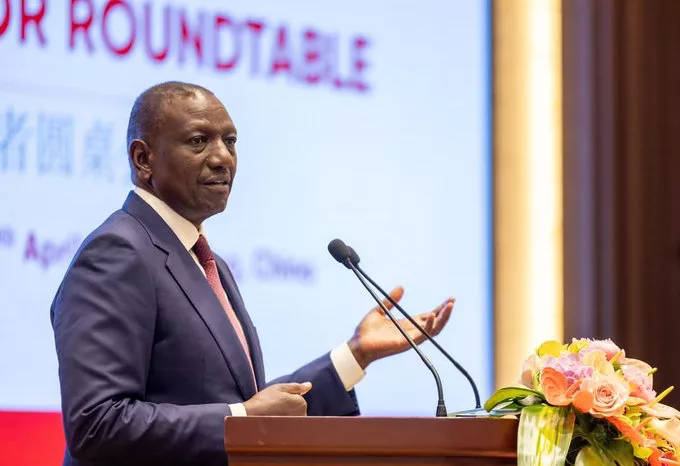|
Getting your Trinity Audio player ready...
|
- President Ruto calls for a reimagined Sino-African partnership focused on infrastructure, industrial value chains, and minerals beneficiation.
- His vision aligns with SADC’s priorities for trade-based development and inclusive growth through value addition in mineral-rich economies.
- China is now Sub-Saharan Africa’s largest trading partner. Over 3,000 Chinese companies operate in Africa, most from the private sector.
NAIROBI, Wednesday, May 07, 2025 – Kenyan President William Ruto has called for a revitalised Sino-African partnership, anchored in infrastructure-led development, industrial value chains, and minerals beneficiation, that reflects the continent’s rising agency and ambition.
Delivering a keynote address at Peking University on his recent state visit to China, President Ruto argued that Africa must seize the moment to shape a new global order founded on mutual respect and strategic cooperation that will benefit the continent.
“This is a time of profound and accelerated global change; within these challenges are opportunities for renewed partnership, bold thinking, and a reimagined global architecture,” the President said.
He highlighted the pivotal role of infrastructure investments under China’s Belt and Road Initiative (BRI) such as the Standard Gauge Railway, which is reshaping regional connectivity and integration.
“We must not only build the roads and rails of trade but also the industries and value chains that ensure Africans own a greater share of the economic upside,” Ruto said.
“But even as we celebrate these achievements, we must confront a sobering truth: the post-war multilateral system is broken, dysfunctional, and no longer fit for purpose; the escalating trade tariff war may be its final death blow,” the President observed.
President Ruto’s call for a new model of partnership aligns strongly with the Southern African Development Community (SADC)’s strategy of leveraging mineral wealth for inclusive development. His address reflected a growing consensus across the region that trade-based partnerships must replace extractive models of the past. He also cited past successes in China-Southern Africa cooperation as evidence that mutually beneficial arrangements are not only possible but essential.
China is now Sub-Saharan Africa’s largest trading partner, with over 3,000 Chinese firms, primarily the private sector, operating across the continent. The President acknowledged these growing economic ties but cautioned that they must evolve to reflect Africa’s developmental priorities, demographic shifts, and environmental vulnerabilities.
The President also issued a strong critique of global governance institutions, arguing that bodies like the UN Security Council and Bretton Woods institutions have failed to serve the interests of Africa and the Global South. He called for a more democratic, representative, and transparent global architecture, one where Africa’s voice carries weight.
“We must therefore imagine a new peace and security architecture, one rooted in democracy, equity, transparency, and equal regional representation,” he said.
On climate and economic justice, Ruto reiterated Africa’s disproportionate burden in the face of global emissions and financing constraints. With a median age of 19 and a growing labour force, Africa is poised to become the engine of global growth, but only if global capital and partnerships flow toward value creation on the continent.
“By 2050, Africa will account for a quarter of the world’s workforce, the same proportion as China today. If the first half of this century belongs to China, the second half will belong to Africa,” Ruto said.
There have increasingly been closer political, security, and economic ties between China and African nations. Trade between China and Africa increased by 700% during the 1990s, and China is currently Africa’s largest trading partner. In 2000, the Forum on China-Africa Cooperation (FOCAC) was established as a multilateral platform for exchange and cooperation between China and African countries that have formal diplomatic relationships with China.
The President’s message signals a clear pivot from donor-recipient dynamics to an era of strategic, agency-driven African diplomacy. For Southern African economies rich in mineral resources, regional integration, and trade corridors, his vision provides a timely call to action for building a shared future that works for Africa.






